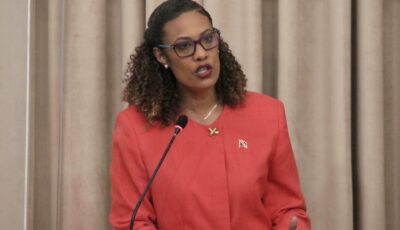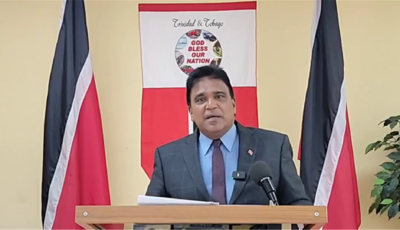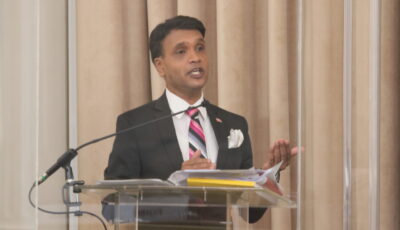UNC: Local Gov’t Elections Deadline for Filing Nominations Friday April 26, 2019
 The United National Congress (UNC) wishes to advise that the Deadline for Filing Nominations to be considered as the candidate to contest a seat in the Local Government Elections scheduled to be held in Trinidad later this year is on Friday April 26th, 2019 at 4:00 p.m.
The United National Congress (UNC) wishes to advise that the Deadline for Filing Nominations to be considered as the candidate to contest a seat in the Local Government Elections scheduled to be held in Trinidad later this year is on Friday April 26th, 2019 at 4:00 p.m.
Nomination Forms are to be filed at the UNC Headquarters, Lot 26 Southern Main Road, Exchange Village, Couva. Nomination Forms can be collected at the Headquarters, Lot 26 Southern Main Road, Exchange Village, Couva between the hours of 8:30 a.m. and 4:00 p.m. For further information, please contact the Headquarters of the United National Congress at 636-8145.
Prospective Applicants should read the Municipal Corporations Act and Representation of the People Act for guidance on qualification.
Representation of the people Act
Chapter 2:01
7. (1) On the day and at the fixed place for the nomination of candidates, the Returning Officer shall attend between the hours of nine o’clock in the morning and twelve noon and between the hours of one and three o’clock in the afternoon for the purpose of receiving the nomination of any duly qualified candidate.
(2) Every candidate for election shall be nominated by six or more persons, whose names appear on the lists of electors supplied to the Returning Officer under rule 5, singing as proposers a nomination paper in duplicate in the form set out as Form No. 37 or 38, as the case may be, in the validly nominated notwithstanding that subsequent to his signing the nomination paper any person by whom the nomination paper was signed had been struck off any list of electors for that electoral district.
(3) No nomination paper shall be valid or shall be acted upon by the Returning Officer unless it is accompanied by the consent in writing of the person therein nominated or, where the person is absent from Trinidad and Tobago, by the consent of his duly authorised agent expressed in duplicate in the form set out as Form No.37 or 38, as the case may be, in the Prescribed Forms Rules.
(4)The nomination paper shall state the full names and addresses of the candidate and his proposers, the occupation of the candidate and the registration numbers of his proposers.
(5) Each candidate shall be nominated by a separate nomination paper.
(6) A person shall not at any election be nominated as a candidate for more than one electoral district.
(7)When at any election nomination papers are received nominating the same person as a candidate for more than one electoral district, every such nomination shall be deemed to be void and the deposit accompanying every such nomination shall forthwith be forfeited and paid into general revenue.
8. Every candidate shall at the time fixed for the nomination of candidates cause to be delivered to the Returning Officer a statutory declaration of his qualifications made and subscribed to by him or, if he is absent from Trinidad and Tobago on the day when the same is subscribed, by his duly authorised agent, in duplicate in one of the forms set out as Form No.39, Form No.40, form No.41, Form No.42, Form No.43, Form No.44 in the Prescribed Forms Rules, as the case may be; and if the statutory declaration is not delivered as aforesaid the nomination of the candidate shall be deemed void.
Municipal Corporations Act
Constitution of Municipal Corporations.
Chapter 25-04
8. (1) The Mayor, Aldermen, Councillors and electors of each of the Municipalities referred to in paragraphs (a) to (e) of section 5(1) and each town, district, or place to which this Act is applied pursuant to section 5(2), shall be a body corporate bearing the corporate name mentioned in the First and Second Schedules, or in the Order made under section 5(2), as the case may be; and by such name shall have perpetual succession.
(2) Every Corporation shall have and use a common seal which shall be approved by its Council, and which shall be judicially noticed.
9. For the purposes of this Act, every Municipality shall include all the lands, houses and buildings within the boundaries set forth in relation to it in the First and Second Schedules, or in the Order made under section 5(2).
10. (1) The powers of a Corporation shall be exercised by its Council and, subject to the provisions of this Act, the Council shall act through its Chief Officers and staff.
(2) The Council shall consist of the Mayor, Aldermen and Councillors.
11. (1) Councillors shall be elected by the electors for each
Municipality in the manner provided for in the Representation of the People Act.
(2) The number of Councillors to be elected to the
Council of each Corporation shall, subject to the provisions of the Elections and Boundaries Commission (Local Government) Act, be as set out in the Third Schedule, or in any Order made pursuant to section 5(2).
(3) One Councillor shall be returned for each electoral district.
(4) The term of office of Councillors shall be three
years, and they shall retire together on the last day of every triennial period, the first of which shall be deemed to have begun on the day on which the Councillors were elected to office. (4A) An election referred to in subsection (1) shall be held within three months of the expiry of the term of office of the Mayor, Councillors and Aldermen comprising the Council.
(4B) Notwithstanding subsection (4A), for the purposes only of the elections due in the year 1995, under this section, such election shall be held within nine months of the expiry of the terms of office of the Councillors and Aldermen comprising the Council.
(4C) Notwithstanding subsection (4A), for the purposes only of the elections due in the year 2002, under this section, such election shall be held within one year of the expiry of the terms of office of the Councillors and Aldermen comprising the Council.
(5) A Councillor who has been elected to fill a vacancy shall hold office until the time when the person whose vacancy he filled would have gone out of office through effluxion of time.
(6) Subject to subsection (7), a person is qualified to be elected as a Councillor if, and is qualified to continue to be a Councillor if, he—
(a) is a citizen of Trinidad and Tobago;
(b) is qualified to be an elector under section 13 of the Representation of the People Act except that such person is not disqualified to be a candidate
by reason only that—
(i) he resides; or
(ii) his qualifying property is situated, in the electoral area but in an electoral district other than the electoral district for which he seeks to be a candidate;
(c) is able to speak and, unless incapacitated by blindness or other physical cause, to read the English language.
(7) In subsection (6), “electoral area” and “electoral district” have the meanings assigned to those expressions in section 2 of the Elections and Boundaries Commission (Local Government) Act.
(8) A person is disqualified from being a Councillor
if he—
(a) is by virtue of his own act under any acknowledgement of allegiance, obedience or adherence to a foreign power or State;
(b) has been adjudged or otherwise declared bankrupt and has not been discharged;
(c) is a mentally ill person within the meaning of the Mental Health Act;
(d) is under sentence of death or is serving a sentence of imprisonment exceeding twelve months imposed on him by a Court of competent jurisdiction in Trinidad and Tobago or substituted by competent authority for some other sentence imposed on him by such a Court or is under such a sentence of imprisonment the execution of which has been suspended;
(e) is disqualified for such election under the Representation of the People Act;
(f) is a member of the Senate, the House of Representatives, the Tobago House of Assembly or another Municipal Council;
(g) holds any office or place of profit, other than Mayor or Deputy Mayor, in the gift or disposal of the Corporation; but a person shall not be disqualified by reason of—
(i) receiving or being entitled to receive payment by way only of travelling or subsistence allowances, or a refund ofout-of-pocket expenses;
(ii) his receiving fees as a medical practitioner from the Corporation as the local authority of a sanitary district, fees for the notification of cases of infectious diseases under the Public Health Ordinance or any similar written law;
(h) is debarred from exercising the practice of his profession on account of any act involving dishonesty;
(i) has within five years before the day of the election or since his election been surcharged to an amount exceeding two thousand five hundred dollars under the Exchequer and Audit Act or under Part VI of this Act.
12. (1) Save for the requirement that Councillors be residents or owners of property within a Municipality, Aldermen shall be persons who qualify to be Councillors and who possess demonstrated knowledge, expertise or experience in professional or vocational occupations suitable to the development focus of the Municipality.
(2) The number of Aldermen to be elected to the Council of each Corporation shall be as set out in the Third Schedule, or in the Order made pursuant to section 5(2); but the number of Aldermen to be elected to the Council of each Corporation referred to in the Second Part of the Second Schedule shall be two in number.
(3) In the case of a Municipal Corporation other than a
City or Borough, at least one Alderman shall be elected from qualified persons who are members of a Village or Community Council functioning within the Municipality.
(4) Aldermen shall be elected by the Councillors, so however, that a person who has been elected as a Councillor shall not be elected as an Alderman.
(5) The term of office of Aldermen shall be three years and they shall retire together on the last day of every triennial period, the first of which shall be deemed to have begun on the day on which the Councillors were elected to office.
(6) An Alderman who is elected to fill a vacancy shall hold office until the time when the Alderman whose vacant seat he filled would have gone out of office through effluxion of time.
13. (1) Subject to the provisions of this Act, the election of Aldermen shall be held at a meeting of the Council convened for that purpose no more than ten days after the day on which the Councillors were elected to office and at this meeting of which the Chief Executive Officer shall be the Chairman, the business to be transacted shall be—
(a) firstly, the production to the Chief Executive Officer by each Councillor of the copy of the declaration of his election as a Councillor delivered to him by the Returning Officer in accordance with the Election Rules made under the Representation of the People Act;
(b) secondly, the taking of the oath of office by those Councillors who have made and subscribed the declaration of acceptance of office and are in attendance at the meeting;
(c) thirdly, the election of Aldermen.
(2) At the election of Aldermen the following shall apply:
(a) a Councillor may vote for any number of persons not exceeding the number of vacancies by filing in, signing and personally delivering to the Chief Executive Officer, a voting paper containing the surnames and other names and the place of abode and descriptions of the persons for whom he votes;
(b) the Chief Executive Officer, as soon as all the voting papers have been handed to him, shall openly produce and read them or cause them to be read, and, after declaring the result of the election, shall keep them for twelve months in a sealed envelope and at the end of that time he shall destroy them;
(c) the persons, not exceeding the number of vacancies, who are found to have the most votes, shall be declared to be, and shall thereupon be elected Aldermen of the Corporation;
(d) in the case of an equality of votes, the meeting shall determine by lot which of the persons obtaining such equal votes shall be elected as Aldermen.
(3) An election under this section or under section 15 shall not be rendered void by reason of the fact that any Councillor present and voting in an election held under either of these sections is later held under the Representation of the People Act not to have been elected to office as such Councillor or to be otherwise disqualified.
(4) Where a vacancy occurs in the office of Alderman, the Council shall, within thirty days of the occurrence of the vacancy being reported to it in writing by the Chief Executive Officer, hold a meeting for the purpose of electing a person to fill the vacancy.
(5) At any election under subsection (4), the provisions of subsection (2) shall apply, except that—
(a) in paragraphs (a) and (b) of subsection (2), the reference to the Chief Executive Officer shall be construed as a reference to the Mayor or Deputy Mayor, as the case may be; and
(b) in paragraph (b) there shall be substituted for the words beginning with “keep them” to the end of that paragraph, the words “deliver them to the Chief Executive Officer to be kept for twelve months in a sealed envelope and at the end of that time the Chief Executive Officer shall destroy them”.
14. (1) The Mayor and Deputy Mayor of a Corporation shall be elected from among the Aldermen and the Councillors of that Corporation.
(2) The election of the Mayor and the Deputy Mayor of a Corporation shall be held at a meeting of the Council convened for that purpose on the third day next following that on which the election of Aldermen has been held and, save for the taking of the oath of office by any Aldermen elected under section 13 and by any newly elected Councillors who have not done so previously, no business other than the election of the Mayor and the Deputy Mayor and the appointment of the Standing and other Committees of the Council shall be transacted on that day.
(3) The election of the Mayor and of the Deputy Mayor shall be by motion duly seconded and shall be presided over by a Councillor or an Alderman who is not a candidate for the office of Mayor or Deputy Mayor.
15. (1) The Mayor shall hold office for a term which shall be the same as that of the Councillors and Aldermen. (2) unless the Mayor resigns or ceases to be qualified or becomes disqualified or is removed from office in accordance with this Act, he shall continue in office until his successor in office has accepted office and has made and subscribed the appropriate declaration.
16. A Mayor shall be removed as Chairman of a Council upon the resolution passed by the Council and supported by the votes of not less than three-fourths of all the members of the Council.
17. (1) The Mayor, Aldermen and Councillors shall receive such honoraria as may be prescribed out of the ordinary revenues of the Corporation in equal monthly instalments at the end of each month.
(2) The Mayor, Aldermen and Councillors of a Corporation shall be paid out of the ordinary revenues of the Corporation such allowance as may be prescribed.
(3) The Chairman-Convenor of a committee of the Council of a Corporation shall be paid out of the ordinary revenues of the Corporation such allowance as may be prescribed in respect of the performance of his duties as such.
18. The President may, subject to negative resolution of Parliament, make Regulations for the purposes of section 17.
19. (1) Each Alderman or Councillor elected before and holding office in a Corporation at the commencement of this Act shall, so long as he continues to be qualified to hold such office under this Act, hold office in that Corporation until the date when he would have ceased to hold office if this Act had not been passed. (2) Each Mayor or Deputy Mayor, elected before and holding office in a Corporation at the commencement of this Act shall continue to hold the respective office in that Corporation until the date when he would have ceased to hold such office if this Act had not been passed.
20. The Mayor and Deputy Mayor of a Corporation shall by virtue of their offices be Justices of the Peace for the Municipality and shall, unless disqualified for re-election to their respective offices, continue to be Justices of the Peace during the year next after they cease to be Mayor and Deputy Mayor respectively.
21. (1) The Deputy Mayor of a Corporation shall hold office during the term of office of the Mayor, and, in case of absence or illness of the Mayor, shall have authority to exercise all the powers and discharge all the duties vested in and imposed upon the Mayor under and by virtue of this Act; and all things done, exercised, or suffered by the Deputy Mayor as aforesaid shall be as valid and effectual in all respects as if they had been done, exercised, or suffered by the Mayor.
(2) Whenever the Deputy Mayor discharges the duties of the Mayor for seven consecutive days or more, he shall, during that period, be entitled to be paid the honorarium and the allowances relating to the office of Mayor.
(3) Notwithstanding subsection (2), there shall be no abatement of the honorarium and allowances payable to the Mayor during his absence from office where such absence does not exceed a period of thirty days in the aggregate during any term of one year.
(4) In the event of the death, resignation, removal or disqualification of the Mayor for any cause, the Deputy Mayor shall forthwith succeed to the office of Mayor, and shall continue in such office until the date when the Mayor would have gone out of office by effluxion of time.
(5) In the event of the Deputy Mayor succeeding to the office of Mayor under subsection (4) or, in the event of the death, resignation or disqualification of the Deputy Mayor for any cause, the Council may appoint to the office of Deputy Mayor an Alderman or Councillor who shall hold such office until the date when the Deputy Mayor whom he succeeded would have gone out of office by effluxion of time.
(6) If the Mayor is dead or absent or otherwise incapable of acting in the exercise of his powers and duties under this Act or any other written law, and the Deputy Mayor is also incapable of acting for any of the reasons herein before specified, the Council shall forthwith elect an Alderman or Councillor to exercise those powers and duties in place of the Mayor for such term not exceeding the period after which the Mayor would have gone out of office by effluxion of time, as the Council may, by resolution, determine.






